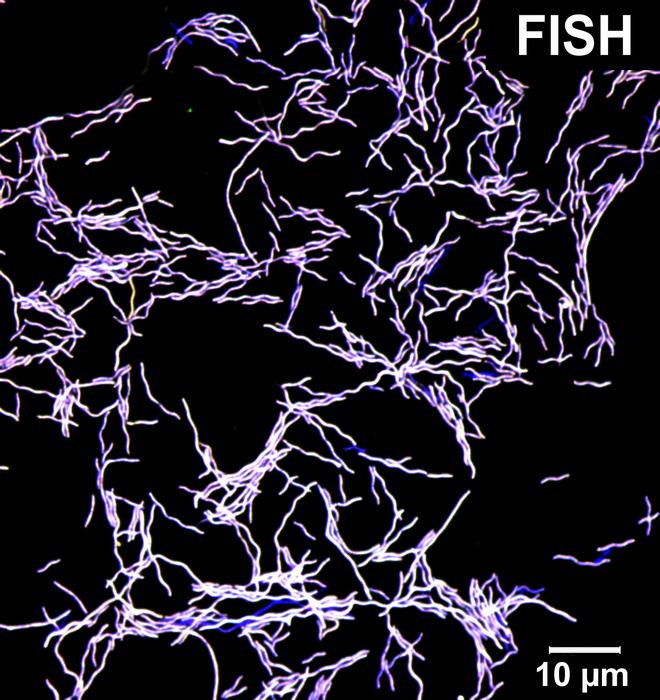An international team of scientists led by microbiologist Alexander Loy from the University of Vienna has discovered a new intestinal microbe that feeds exclusively on taurine and produces the foul-smelling gas hydrogen sulfide. The researchers have thus provided another building block in the understanding of those microbial processes that have fascinating effects on health. This is also true of Taurinivorans muris: the bacterium shows a protective function against Klebsiella and Salmonella, two important pathogens. The results are currently published in Nature Communications.

Credit: C: Huimin Ye
An international team of scientists led by microbiologist Alexander Loy from the University of Vienna has discovered a new intestinal microbe that feeds exclusively on taurine and produces the foul-smelling gas hydrogen sulfide. The researchers have thus provided another building block in the understanding of those microbial processes that have fascinating effects on health. This is also true of Taurinivorans muris: the bacterium shows a protective function against Klebsiella and Salmonella, two important pathogens. The results are currently published in Nature Communications.
What’s that smell?
The gut microbiome mediates our health in a myriad of ways. One of those ways is by contributing to the levels of hydrogen sulfide – the toxic gas responsible for foul smelling farts. Having small amounts of hydrogen sulfide in the gut is a good thing; in fact, it’s essential for a number of physiological processes, and can even protect against pathogens. Hydrogen sulfide-producing microbes in the gut may help “choke out” oxygen-dependent pathogens such as Klebsiella, making it harder for them to colonize.
However, excessive levels can have negative consequences and have been associated with gut inflammation and damage to the intestinal lining. Discovering the key players and processes that produce this noxious gas in our gut is a fundamental first step on the road to developing therapeutic interventions, for example, for inflammatory bowel disease.
Keeping young: the role of taurine
The bacterium Bilophila wadsworthia is one of the most important taurine utilizers in humans. In the current study, researchers led by Alexander Loy at CeMESS, the Centre for Microbiology and Environmental Systems Science of the University of Vienna, have discovered a new genus of hydrogen sulfide-producing bacteria in the mouse intestine. “The bacterium we described has a rather unbalanced diet,” explains Loy, “it specializes in consuming taurine.” Taurine is a semi-essential amino acid, which we synthesize in small amounts in our liver. However, we get most of our taurine from our diets – especially meat, dairy and seafood.
Like hydrogen sulfide, taurine is implicated in a smorgasbord of physiological processes. Recent studies have found a link between taurine and healthy ageing – it seems this nutrient may stave away age-related disease. In light of these findings, the discovery of a new gut microbe that feeds exclusively on taurine (aptly named Taurinivorans muris) is another piece of an exciting puzzle. “By isolating the first taurine degrader in the mouse gut, we’re one step closer to understanding how these gut microbes mediate animal and human health” explains Huimin Ye, lead author of the study.
To access sufficient taurine in the gut, however, Taurinivorans muris needs the help of other gut microbes to release it from bile acids. Taurine-containing bile acids are produced in the liver and are increasingly released into the intestine during a high-fat diet to help our body digest fats. The activities of the bacteria in the intestine in turn influence the bile acid metabolism in the liver. The results of the Viennese researchers therefore also contribute to a better understanding of these complex interactions in bile acid metabolism, which has an impact on processes and diseases throughout the body.
Taurine degrading microbes protect against pathogens
One of the most important functions of the symbiotic microbes in the gut is to defend against pathogens. The microbiome has a versatile arsenal of protective mechanisms – and utilizing taurine to create hydrogen sulfide is one of them. “Hydrogen sulfide may suppress the oxygen-dependent metabolism of some pathogens,” explains Ye. In the present study, the researchers found that Taurinivorans muris has a protective role against Klebsiella and Salmonella, two important gut pathogens. “The protective mechanism of Taurinivorans muris against pathogens may be via hydrogen sulfide but is essentially not yet fully understood” adds Alexander Loy. Taurine is one of the most important sources of hydrogen sulfide production in the gut. The study thus generates basic knowledge on the physiological interactions between the different gut microbes and their hosts, which is necessary to develop new microbiome-based therapies.
Links:
Research group of Alexander Loy
Division of Microbial Ecology, University of Vienna
Centre for Microbiology and Environmental Systems Science (CMESS), University of Vienna
Journal
Nature Communications
DOI
10.1038/s41467-023-41008-z
Article Title
Ecophysiology and interactions of a taurine-respiring bacterium in the mouse gut
Article Publication Date
18-Sep-2023




